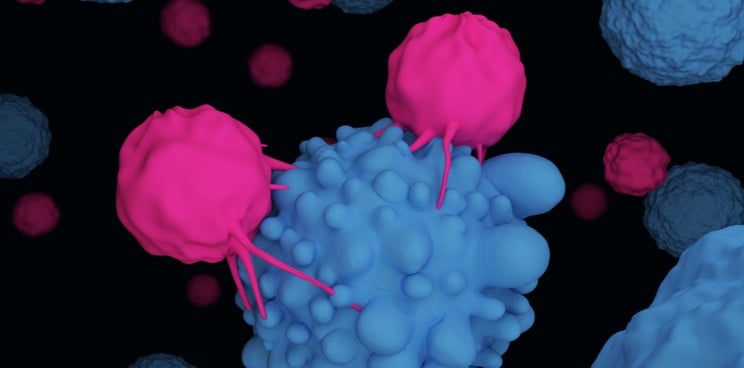Newsletter Signup - Under Article / In Page
"*" indicates required fields
2022 is coming to an end. Here is a list of biotech companies from around the world that we are keeping in our sights in 2023.
The year 2022 has seen a lot of uncertainty in biotech markets, resulting in tumbling or volatile stocks. A high number of biotech companies are even trading with market capitalizations lower than the amount of cash they hold.
However, life sciences investors such as the European heavyweight Sofinnova hunt for opportunities amid the tumult. Meanwhile, there have been plenty of large funding rounds, promising clinical readouts and product approvals over the year.
With the help of investors and analysts, we have made a shortlist of 10 biotech companies that are worth watching out for in 2023.
This healthcare-focused list contains public and private biotech companies from around the world with something to look forward to in 2023. They have been selected for a variety of reasons, including promising clinical data, recent or upcoming approvals and successful fundraising.
Table of contents
Adaptimmune Therapeutics PLC
Headquarters: U.K.
A biotech based in the U.K., Adaptimmune is a key European player in the field of T-cell therapy.
Existing T-cell therapies are of a type known as CAR-T therapies, where the patient’s T cells are extracted, genetically modified with a cancer-hunting CAR protein, and reinfused. These CAR-T therapies are primarily aimed at treating forms of blood cancer and are limited when tackling solid tumors.
In contrast, Adaptimmune’s T-cell therapy candidates — called TCR-T cell therapies — are designed to tackle solid cancers. This is because they are genetically modified to express a custom version of a T-cell protein called a TCR, which is better at sniffing out signs of cancer hidden within solid tumor cells.
Over the years, Adaptimmune has battled safety scares with its clinical-stage TCR-T cell therapies. Its stock price has also tumbled 60% since the beginning of 2022 as it has had delays getting an off-the-shelf TCR-T into clinical testing.
However, the biotech company has cause for hope in 2023: Adaptimmune plans to apply for approval of its lead TCR-T cell therapy from the U.S. Food and Drug Administration (FDA) by the end of 2022. The planned indication, synovial sarcoma, may have a small patient pool, but an approval could be an important step forward for Adaptimmune and the TCR field as a whole.

Argenx
Headquarters: Netherlands
As biotech stock markets continued to stagnate in 2022, Argenx was one of the few biotech companies whose stock price increased.
The company’s lead drug is an antibody fragment called efgartigimod and branded as Vyvgart. Vyvgart was approved by the U.S. FDA at the end of 2021 for the treatment of the autoimmune condition generalized myasthenia gravis. EU approval followed in August 2022, and Argenx exceeded revenue expectations from sales of the drug.
In 2023, the biotech company expects to gain approval decisions for Vyvgart in countries including China, Canada and Israel. Meanwhile, Argenx plans to publish results from a highly anticipated phase 2a trial of efgartigimod for the treatment of the autoimmune disorder chronic inflammatory demyelinating polyneuropathy, amongst other clinical trials.
Axsome Therapeutics Inc.
Headquarters: U.S.
Axsome Therapeutics is an advanced clinical-stage biopharmaceutical firm developing medicines with a focus on conditions affecting the central nervous system.
In August 2022, Axsome bagged a U.S. FDA approval for Auvelity: a combination of the existing drugs dextromethorphan — commonly used to suppress coughs — and the antidepressant bupropion. Auvelity was approved for the treatment of major depressive disorder and could have blockbuster potential if the company can make it compete with generic competitor drugs.
In addition to the success of Auvelity, Axsome has seen a promising phase 3 readout for a candidate treatment for agitation in Alzheimer’s disease. In 2023, Axsome is also expected to report phase 3 results for a candidate drug for the treatment of narcolepsy.
BioArctic
Headquarters: Sweden
BioArctic could expect a rollercoaster year in 2023. The Alzheimer’s disease-focused biotech company hit the headlines this year when its partner Eisai touted phase 3 results from the antibody drug lecanemab.
According to the phase 3 readout, lecanemab modestly slowed the decline in cognition and memory in Alzheimer’s disease patients. However, the drug can result in severe side effects, and more data is needed to know if the drug can help for longer than 18 months.
Nonetheless, lecanemab’s phase 3 performance is seen as a rare success in a sea of disappointing clinical outcomes from Alzheimer’s treatments in the last decade. It will be intriguing to see if the drug can navigate the thorny regulatory path to the Alzheimer’s disease market after the controversial Aduhelm failed to gain commercial traction.
Galapagos NV
Headquarters: Belgium
Galapagos was flying high in the last decade. The Belgian biotech sealed a drug development deal with Gilead worth billions of dollars in 2019. The partners also co-developed Galapagos’ lead candidate filgotinib, and gained EU approval to market the drug for rheumatoid arthritis in 2020.
However, the U.S. FDA ruined Gilead and Galapagos’ party with a rejection letter in the same year. Following a string of clinical disappointments from other drug candidates, Gilead reduced its participation in the development of filgotinib and left Galapagos to take on the commercialization.
In 2022, Galapagos made a surprising pivot into the cell therapy space when it acquired the specialists CellPoint and AboundBio. It also refocused its drug development efforts from fibrosis and kidney disease to oncology.
In 2023, Galapagos may have further developments on the cell therapy and oncology side. In addition, the company expects to read out phase 3 results of filgotinib in a different inflammatory disease indication: Crohn’s disease.
InSilico Medicine
Headquarters: Hong Kong
The deployment of artificial intelligence (AI) is hot in drug discovery at the moment, led by heavyweights like Exscientia in the U.K. It promises to automate and streamline the costly trial-and-error methodology of drug discovery in the pharmaceutical industry.
InSilico Medicine uses AI platforms to discover new drug targets and new drug candidates, with a focus on cancer, fibrosis, central nervous system diseases, aging-related diseases and more. It can also guide the structuring of clinical trials to test the drugs.
In 2021, the startup bagged a massive $255 million Series C round, and followed up in 2022 with a Series D round worth $95 million, in addition to a $1.2 billion collaboration deal with Sanofi.
InSilico also launched its first phase 1 trial of a drug candidate, which is in development for the treatment of idiopathic pulmonary fibrosis. In 2023, the biotech company might publish the phase 1 results, and take more of its candidates into clinical testing.

Mesoblast Ltd
Headquarters: Australia
Mesoblast was founded in 2004 and specializes in the development of regenerative medicine approaches.
The firm’s lead candidate therapy, remestemcel-L, is designed to tackle inflammatory diseases in children and adults. The main target indication is acute graft versus host disease (aGVHD), a condition that can arise when a patient is given a bone marrow transplant and transplanted immune cells attack the host body.
To treat inflammation, Mesoblast sources a type of cell called mesenchymal stromal cells from a donor unrelated to the patient. The biotech company cultures and expands the cells to make remestemcel-L, which is thought to clamp down on the inflammation.
In 2020, the U.S. FDA rejected remestemcel-L, which was going to be branded as Ryoncil, for the treatment of children with aGVHD. The agency recommended at least one more randomized controlled trial for more evidence of the effectiveness of the therapy.
Undeterred, Mesoblast is collecting more evidence for the effectiveness of remestemcel-L. The biotech aims to gain U.S. approval and launch the therapy in 2023.
National Resilience Inc.
Headquarters: U.S.
National Resilience was established during the height of the COVID-19 pandemic in 2020. The aim was to modernize the manufacture of biologic medicines such as antibodies and gene and cell therapies at a time of soaring innovation in drug discovery.
In June 2022, Resilience raised a gigantic $625 million Series D round to finance the expansion of its manufacturing facilities in addition to the deployment of cell-free technology in the production of antibody drugs and other biologics. The company later bought a manufacturing plant from the big pharma AstraZeneca in the U.S. and struck a deal to manufacture advanced therapies for the non-profit Mayo Clinic.
With the large cash pile raised in 2022, 2023 could see Resilience taking further steps towards its dream of democratizing access to medicines.
Rebiotix Inc.
Headquarters: U.S.
Owned by the Swiss company Ferring Pharmaceuticals, Rebiotix has a pipeline of microbiome therapeutics that are designed to treat disease by restoring the gut microbiome to a healthy state.
Rebiotix made history in late 2022 by becoming the first player to get a microbiome therapeutic, Rebyota, approved by the U.S. FDA. Rebyota, delivered via an enema, is designed to tackle recurrent infections of the bacterium Clostridium difficile better than current methods with antibiotics.
With a regulatory approval under its belt, Rebiotix is steaming ahead with programs testing an orally-delivered version of the same therapeutic. It will be interesting to see how successful the commercial launch of Rebyota ends up, and when other advanced microbiome players can reach the regulatory finish line.
Tessa Therapeutics Ltd
Headquarters: Singapore
Tessa Therapeutics made a big splash in June 2022 with a Series A financing round worth $126 million.
The firm is developing a pipeline of CAR-T therapies for blood cancer; its lead candidate involves extracting T cells from the patient as do current therapies, and is due to begin the pivotal phase of an ongoing phase 2 trial.
Tessa’s second CAR-T program uses T cells sourced from donors. To reduce the risk of GVHD, Tessa bases this CAR-T therapy on a specific type of T cell that selectively hunts down cells infected with a virus called Epstein Barr Virus. This type of T cell is thought to attack cancer cells with less harm to healthy tissue than other CAR-T cells.
In 2023, Tessa will potentially have more news on its clinical activities, and is infused with big cash to fuel the push. Additionally, a donor-based virus-specific T-cell therapy developed by Atara Biotherapeutics was approved in the EU this week, signaling that Tessa’s model has a shiny new precedent for regulators.
Thanks for tips from Antoine Papiernik, chairman and managing partner of Sofinnova Partners; Dylan van Haaften, managing director, healthcare equity research at Bryan Garnier & Co; Alex Cogut, head of healthcare equity research at Bryan Garnier & Co; Bertrand Delsuc, founder of Biotech Radar; and Fady Riad, CEO of Centurion Life Sciences.






